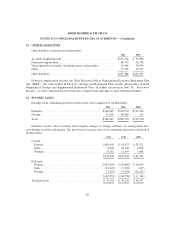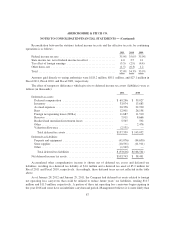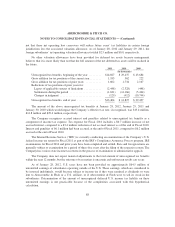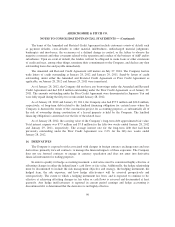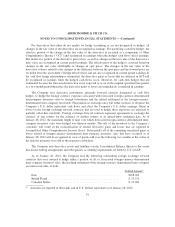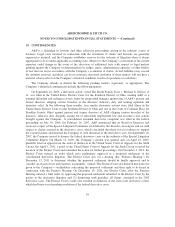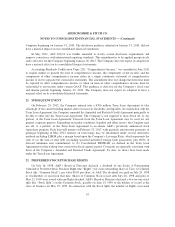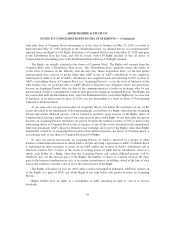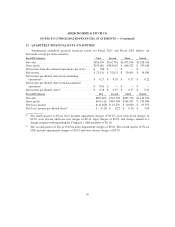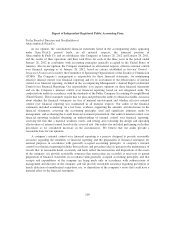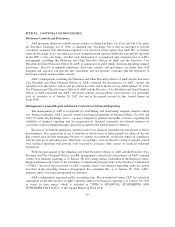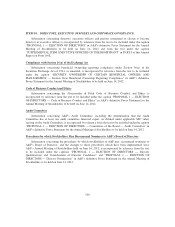Abercrombie & Fitch 2011 Annual Report Download - page 99
Download and view the complete annual report
Please find page 99 of the 2011 Abercrombie & Fitch annual report below. You can navigate through the pages in the report by either clicking on the pages listed below, or by using the keyword search tool below to find specific information within the annual report.ABERCROMBIE & FITCH CO.
NOTES TO CONSOLIDATED FINANCIAL STATEMENTS — (Continued)
On December 21, 2007, Spencer de la Cruz, a former employee, filed an action against
Abercrombie & Fitch Co. and Abercrombie & Fitch Stores, Inc. (collectively, the “Defendants”) in the
Superior Court of Orange County, California (the “Court”). He sought to allege, on behalf of himself and a
putative class of past and present employees in the period beginning on December 19, 2003, claims for
failure to provide meal breaks, for waiting time penalties, for failure to keep accurate employment records,
and for unfair business practices. By successive amendments, plaintiff added 10 additional plaintiffs and
additional claims seeking injunctive relief, unpaid wages, penalties, interest, and attorney’s fees and costs.
Defendants denied the material allegations of plaintiffs’ complaints throughout the litigation and asserted
numerous affirmative defenses. On July 23, 2010, plaintiffs moved for class certification in the action. On
December 9, 2010, after briefing and argument, the Court granted in part and denied in part plaintiffs’
motion, certifying sub-classes to pursue meal break claims, meal premium pay claims, work related travel
claims, travel expense claims, termination pay claims, reporting time claims, bag check claims, pay record
claims, and minimum wage claims. The parties continued to litigate questions relating to the Court’s
certification order and to the merits of plaintiffs’ claims until January 25, 2012. On that date, the named
plaintiffs and the Defendants signed a memorandum of understanding which, subject to final Court
approval, was intended to result in a full and final settlement of all claims in the action on a class-wide
basis. A formal Settlement Agreement and related papers were filed with the Court on February 21, 2012
and the Court scheduled a hearing on March 14, 2012 to determine whether to provide preliminary
approval to the proposed settlement and to order that notice of the proposed settlement be given to the
absent members of the settlement class. On March 14, 2012, the Court continued the hearing to April 18,
2012. As of January 28, 2012, the Company increased its litigation reserve to cover the expected cost of the
proposed settlement.
On October 17, 2011, Amber Echavez, a former employee, filed an action against Abercrombie &
Fitch Co. and two of its subsidiaries (collectively, the “Defendants”) in the Superior Court of Los Angeles
County, California. She alleged the Defendants violated California labor laws by failing to provide suitable
seats for her and for other current and former employees. She sought to maintain the suit as a class action
on behalf of a class of retail sales employees and also as a representative action under California’s Private
Attorney General Act of 2004 (“PAGA”). On November 23, 2011, the Defendants removed the action to
the United States District Court for the Central District of California (the “Court”) and on February 6,
2012, moved (1) to dismiss the action for failure to state a claim and (2) to strike plaintiff’s class
allegations. On March 12, 2012, the Court entered an order denying Defendants’ motion to dismiss and
granting Defendants’ motion to strike plaintiff’s class allegations. The parties are continuing to litigate
plaintiff’s remaining claims.
20. RECENT ACCOUNTING PRONOUNCEMENTS
Accounting Standards Codification 820-10 “Fair Value Measurements and Disclosures,”
(“ASC 820-10”) was amended in January 2010 to require additional disclosures related to recurring and
nonrecurring fair value measurements. The guidance requires disclosure of transfers of assets and liabilities
between Levels 1 and 2 of the fair value hierarchy, including the reasons and the timing of the transfers;
and information on purchases, sales, issuances, and settlements on a gross basis in the reconciliation of the
assets and liabilities measured under Level 3 of the fair value hierarchy. The guidance was effective for the
96


